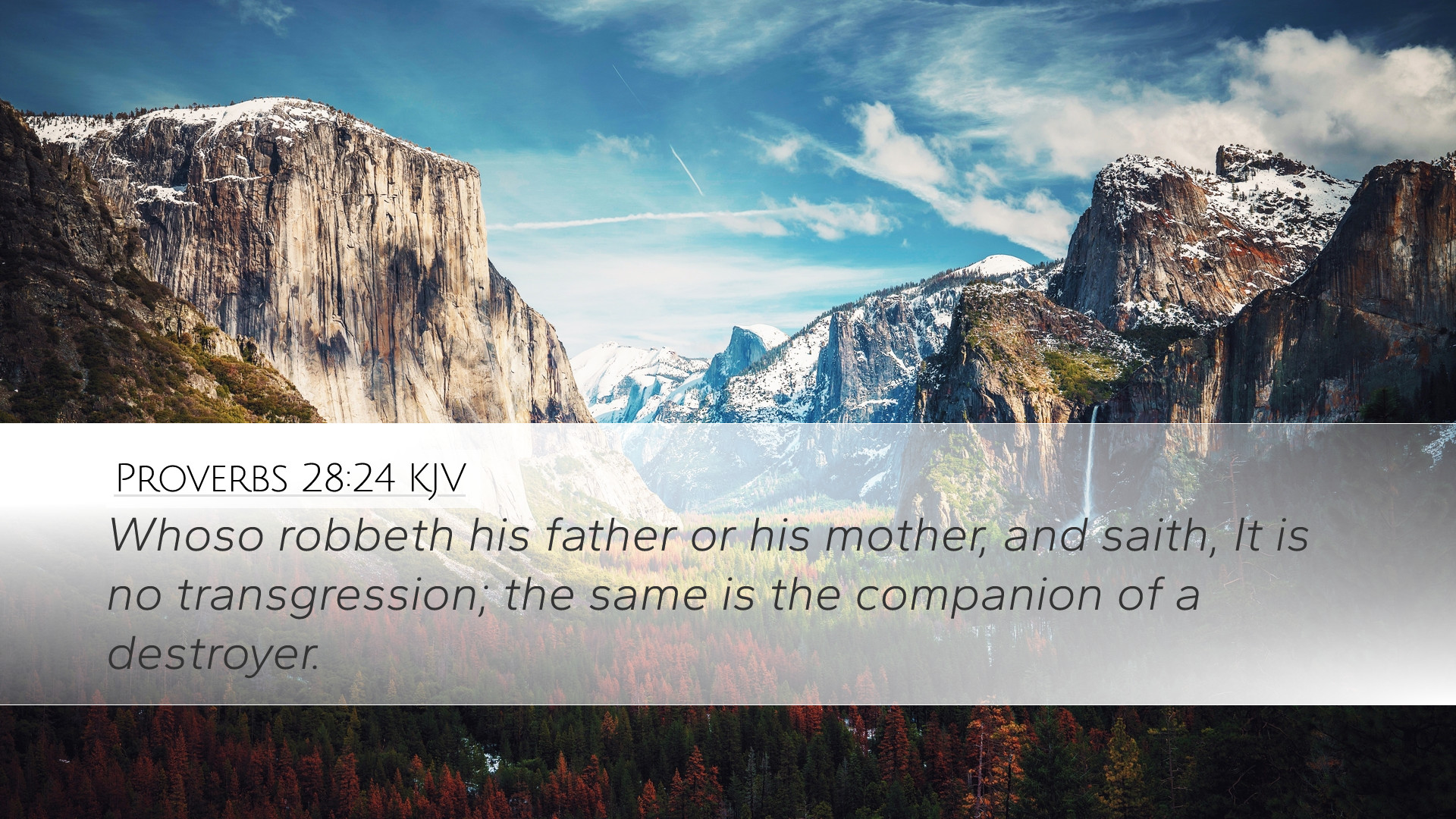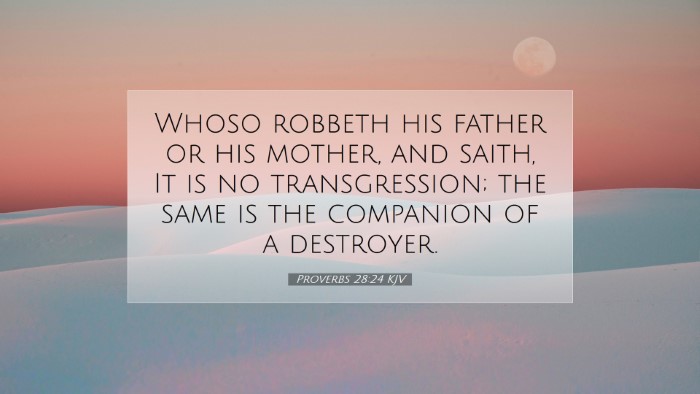Commentary on Proverbs 28:24
Verse: Proverbs 28:24 - "Whoso robbeth his father or his mother, and saith, It is no transgression; the same is the companion of a destroyer."
Introduction
The Book of Proverbs, a cornerstone of wisdom literature in the Bible, often presents profound truths regarding morality, righteousness, and the conduct of life. Proverbs 28:24 explores the grave implications of dishonor towards parents, highlighting the moral decay present in society and the dire consequences of such actions. This commentary synthesizes insights from prominent public domain sources to deeply understand this verse.
Verse Breakdown
This verse can be partitioned into two significant assertions:
- Robbing Parents: The act itself—taking what belongs to one’s parents.
- Self-deception: The justification of such acts as inconsequential.
Robbing Parents
The opening clause, "Whoso robbeth his father or his mother," speaks to a severe breach of familial duties and respect. Matthew Henry comments that this action denotes a willful disregard for the established order and authority of parents. This notion is reinforced through biblical admonitions that advocate honoring one's parents (Exodus 20:12).
Albert Barnes emphasizes that the act of robbing one’s parents may not solely refer to physical possessions but can also account for neglecting responsibilities towards them. He posits this behavior as a serious moral decline, indicative of a society that fails to uphold respect for parental authority.
Self-deception
The phrase "and saith, It is no transgression" reveals an alarming self-justification. Adam Clarke elaborates on this idea, suggesting that the individual seeks to rationalize their wrongdoings, portraying them as inconsequential. Such self-deceit not only affects personal integrity but also engenders a culture of lawlessness where moral distinctions are blurred.
The Companion of a Destroyer
The latter part of the verse states, "the same is the companion of a destroyer." This stark conclusion indicates the destructive nature of such individuals. Henry describes this "destroyer" as someone who acts with malice or vengeance, emphasizing that those who dishonor their parents are aligned with those who promote chaos and destruction within the community.
Barnes reminds us that there are significant spiritual implications for aligning oneself with destruction. Such a person forfeits a path of righteousness and finds themselves in a destructive partnership that leads to moral obliteration and spiritual death.
Theological Implications
This verse raises essential theological considerations regarding familial relationships and community ethics. It touches upon the fabric of societal structure which is deeply interwoven with respect for authority, particularly that of parents. The degradation of this respect leads to broader societal chaos.
Respect for Authority
Respecting parents is not merely a suggestion; it is a divine commandment. Clarke elucidates that the moral decay stemming from disrespect towards parents can translate into broader disobedience toward God and societal laws. The integration of the family unit is crucial for establishing a society that honors God’s design.
Consequences of Unrighteousness
The notion that one who steals from their parents is akin to a destroyer captivates a broader understanding of morality’s repercussions. Proverbs recognize that individual actions are not isolated; they have communal and intergenerational effects. Irresponsibility and selfishness breed corruption that can extend beyond the household, leading to a societal norm where evil is tolerated.
Practical Applications
For pastors, students, and scholars, Proverbs 28:24 serves as a potent reminder of the call to honor familial obligations and societal ethics. Here are several key takeaways:
- Encourage Respect for Parents: Teach the importance of honoring parents as a foundational aspect of faith and morality.
- Moral Clarity: Promote discernment in ethical decisions; understanding that small compromises can lead to deeper moral failures.
- Community Vigilance: Foster a community that acknowledges and addresses disrespect for authority, recognizing that relational health within families reflects the health of society.
Conclusion
Proverbs 28:24 serves as a compelling admonition against dishonoring one’s parents, revealing the dire implications of such behavior. The insights gathered from esteemed biblical commentators like Matthew Henry, Albert Barnes, and Adam Clarke reinforce the necessity of honoring familial relationships and the broader moral order established by God. As we reflect on this verse, let us strive to cultivate respect, honor, and moral integrity in our homes and communities.


